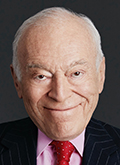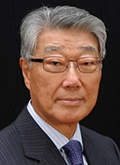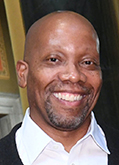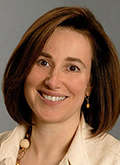$125 Million Gift From Leonard A. Lauder for Tuition-Free Program to Prepare Nurse Practitioners to Provide Primary Care in Underserved U.S. Communities
 On February 14, the University of Pennsylvania announced the Leonard A. Lauder Community Care Nurse Practitioner Program, which will recruit and prepare a diverse cadre of expert nurse practitioners to provide primary care to individuals and families in underserved communities across the U.S. The $125 million donation by Leonard A. Lauder, Chairman Emeritus of the Estée Lauder Companies, to create this first-of-its-kind, tuition-free program is the largest gift ever to an American nursing school. Mr. Lauder is a Penn alumnus. The gift comes at a time when the COVID-19 pandemic has magnified the nation’s acute shortage of primary care providers and persisting inequities in access to quality healthcare.
On February 14, the University of Pennsylvania announced the Leonard A. Lauder Community Care Nurse Practitioner Program, which will recruit and prepare a diverse cadre of expert nurse practitioners to provide primary care to individuals and families in underserved communities across the U.S. The $125 million donation by Leonard A. Lauder, Chairman Emeritus of the Estée Lauder Companies, to create this first-of-its-kind, tuition-free program is the largest gift ever to an American nursing school. Mr. Lauder is a Penn alumnus. The gift comes at a time when the COVID-19 pandemic has magnified the nation’s acute shortage of primary care providers and persisting inequities in access to quality healthcare.
“This is the most timely and consequential gift not only for our university but for our country. It is unprecedented in its potential to address America’s most critical need of providing primary health care to all who currently lack it by investing in nurses,” said former Penn President Amy Gutmann.
“Growing the number of nurse practitioners who are prepared and committed to working in underserved areas is the most practical and inspiring way to ensuring a healthier country. I am grateful and honored that Leonard would make this gift to Penn Nursing, and thrilled to know that it will have an immediate impact that will last far into the future.”
Nurse practitioners are leaders on the front lines of care, a role never more important as Americans confront a primary healthcare shortage in their communities. With their advanced clinical training and graduate education, nurse practitioners have the knowledge and skill to supervise and manage critical aspects of care in a decision-making capacity, from patient diagnosis, to ordering and interpreting tests, to prescribing medication. Nurse practitioners deliver high-quality primary care to people of all ages, including treating common illnesses, managing chronic conditions, and providing preventive care that helps patients stay healthy.
Nurse practitioners are also able to take on key leadership roles, from managing and operating walk-in or community clinics to leading interdisciplinary teams within health systems. The new program will better the lives of patients and communities most in need, while providing a pathway for the many nurses interested in advanced education who may not otherwise have the means to pursue it.
The program:
- Structure: Leonard A. Lauder Community Care Nurse Practitioner Fellows will enroll full-time in a two-year, rigorous Primary Care Nurse Practitioner Program at Penn Nursing.
- Community Practice: Fellows will complete at least 50 percent of their clinical education at community partner sites and/or comparable sites that provide direct patient care, an invaluable experience that will prepare fellows to meet the complex needs of patients and families throughout their careers. Every fellow will be expected to commit to practice or service in an underserved community for two years after graduation.
- Recruitment: Penn Nursing will select 10 fellows to begin classes this fall, growing the program enrollment through 2026 when it will reach its annual target enrollment of 40 fellows, continuing in perpetuity. By 2027, the program will have enrolled 140 excellent nurse practitioner students. Fellows will need to show a commitment to working in underserved communities, where they are needed most, and to promoting health equity.
- Tuition: All participants in the program will enter the workforce free of graduate school debt, receiving student aid to cover their tuition and fees and thereby eliminating any potential financial barriers for nurses and others who wish to enroll. Fellows with greater financial need will also receive stipends to help with living expenses.
- Program Leadership: Penn Nursing will name the first endowed Leonard A. Lauder Community Care Nurse Practitioner Professor, who will oversee curriculum innovation, support of community sites, and program implementation.
- Penn Community Partnership: Penn Nursing will provide support for select community partner sites to support the clinical education of fellows while providing professional development and networking opportunities and access to school and university resources.
“Penn Nursing has a long history of advancing science, promoting equity, practice excellence, and preparing leaders,” said Penn Nursing Dean Antonia Villarruel. “That’s why Mr. Lauder’s gift is so meaningful. The synergy between Penn Nursing and the program will improve the health of underserved patients and families, by uniquely preparing primary care nurse practitioners, who will work with them in their communities. The sustained investment in the education and careers of primary care nurse practitioners and communities is unprecedented. We are excited by the opportunity to lead this important program and to extend its impact beyond Penn Nursing. We are deeply grateful to Mr. Lauder for recognizing and investing in this critical need, and for partnering with us in this ambitious endeavor.”
Stephen P. Fera, Executive Vice President of Independence Blue Cross, which is one of the community partners that will be involved in the new initiative, noted that nurse practitioners are key to improving individual and community care. Said Mr. Fera: “Bolstering the nurse practitioner workforce is a means to improve access to care and strengthen the health care safety net provided by health centers. This is a key priority of the Independence Blue Cross Foundation and our partnership with Penn Nursing has been synergistic in efforts to prepare nurses to work in community-based settings. The program will build and strengthen our individual and collective efforts toward improving the health and well-being of communities.”
“Now more than ever, the country needs greater and more equitable access to quality primary care—and highly-skilled nurse practitioners are the key to making that happen,” said Leonard A. Lauder. “The program will ensure that more Americans receive the essential health care services that everyone deserves, and I’m so pleased to be working with Penn Nursing on this initiative. I look forward to welcoming our first class of future nurse practitioners this fall. I know their expertise will be matched only by their commitment to serving our communities.”
$25 Million Gift from James Joo-Jin Kim to Support Korean Studies, Neurovascular Surgery, and the Wharton School
 On February 17, the University of Pennsylvania announced a $25 million gift from James Joo-Jin Kim, W’59, G’61, GR’63, and Agnes Kim, and the James and Agnes Kim Family Foundation, supporting a range of initiatives at Penn. The largest portion of the multifaceted commitment will create the James Joo-Jin Kim Center for Korean Studies at Penn Arts & Sciences.
On February 17, the University of Pennsylvania announced a $25 million gift from James Joo-Jin Kim, W’59, G’61, GR’63, and Agnes Kim, and the James and Agnes Kim Family Foundation, supporting a range of initiatives at Penn. The largest portion of the multifaceted commitment will create the James Joo-Jin Kim Center for Korean Studies at Penn Arts & Sciences.
The gift also creates the Kim Family Neurovascular Surgery Program at Penn Medicine and the Kim Korean Studies Fund at the Joseph H. Lauder Institute for Management & International Studies, with additional support for the Dean’s Discretionary Fund at the Wharton School.
“James Joo-Jin Kim is an unwavering friend of Penn and a true University citizen,” said Penn Interim President Wendell Pritchett. “I am thrilled to thank the Kim family for this momentous commitment, which exemplifies Jim’s legacy as an unparalleled champion of Korean studies at Penn while offering crucial support for the Wharton School and helping to build a premier program in the vital medical field of neurovascular surgery.”
“It is with great pride that our family gives this gift to the University of Pennsylvania and Penn Medicine,” said Mr. Kim. “As a young immigrant arriving to the United States from Korea, the University provided me with a world-class education while instilling in me an unwavering work ethic. The knowledge and character I gained at Penn helped to pave the road to my success, and I hope this gift helps to pave that road for others.”
The James Joo-Jin Kim Center for Korean Studies
Building on his longstanding support, James Joo-Jin Kim endowed the James Joo-Jin Kim Program in Korean Studies at Penn Arts & Sciences in 2011, putting Penn in the top echelon of universities offering programs in Korean studies. This new commitment will establish an academic center that will provide long-term support for academic and community-focused activities.
“The newly created James Joo-Jin Kim Center for Korean Studies will advance the study of Korea and its expanding role in the world and will elevate Korean Studies at Penn and cement its prominence with our academic peers and in the larger community,” said Steven J. Fluharty, Dean of the Penn Arts & Sciences and Thomas S. Gates, Jr. Professor. “Through this generous gift, we are well positioned to support excellence among our current faculty, recruit top Korean studies scholars in the future, expand opportunities for students interested in the study of Korea, and make significant contributions to the field in perpetuity.”
“The popularity of Korean music, movies, and television shows has grown global interest in Korean culture and society, providing a unique opportunity for advancing transformative Korean studies,” said Hyunjoon Park, Korea Foundation Professor of Sociology and Director of the James Joo-Jin Kim Program in Korean Studies. “The establishment of the Kim Center will magnify interdisciplinary teaching and research that integrate social scientific and humanistic approaches and embrace comparative perspectives that connect Korea to broad global communities in addressing worldwide challenges such as inequality, climate change, migration, and pandemics.”
In addition to expanding the Center’s existing physical space on campus, the Kim family’s gift will endow a professorship, launch a global conference on Korea, create fellowship opportunities for graduate and undergraduate students, and sponsor a global forum that will connect Kim Center scholars with Korean alumni and parents.
“We will devote considerable energy and concerted efforts to collaborate with local communities in Philadelphia. One new project, ‘Koreans in Philadelphia,’ will involve research and cultural events to highlight the legacies and achievements of the Korean-American community in the region,” said Park. “We also hope to work closely with local public K-12 schools to develop curricula and cultural awareness of contemporary and historical Korea. We are excited about all of the great opportunities arising thanks to the Kim family.”
“Continued investment in the field of Korean Studies through the creation of the Kim Center, in conjunction with programs at the Lauder Institute and the Wharton School, is critical in solidifying the relevance of Korean studies at the University and beyond,” said Mr. Kim, “We look forward to the positive impact the Kim Center will have both on and off campus.”
The Kim Family Neurovascular Surgery Program at Penn Medicine
The Kim family’s gift will also launch the Kim Family Neurovascular Surgery Program at Penn Medicine. This funding will allow the Department of Neurosurgery to establish a comprehensive platform for the development of new technologies for treating neurovascular disorders—including strokes, brain hemorrhages, aneurysms, and cerebral vascular malformations—from initial design to translation into patient care. The program will ultimately improve the lives of patients with these life-altering medical conditions.
“We are tremendously fortunate to have visionary donors like James Joo-Jin Kim and his family, and the establishment of the Kim Family Neurovascular Surgery Program is a powerful demonstration of their commitment to advancing health care,” said J. Larry Jameson, Executive Vice President of the University of Pennsylvania for the Health System and Dean of the Perelman School of Medicine. “With the leadership of Dr. Daniel Yoshor and the department’s brilliant faculty, the Kim Family Program promises to make Penn Medicine a national destination for neurovascular treatment.”
The Kim Family Program will include a neurovascular innovation lab that will develop novel technologies to treat disorders involving the blood vessels in the brain, as well as approaches for preserving or restoring neurological function that is lost after stroke or brain hemorrhage. Designed to leverage Penn’s expertise in neurosciences, engineering, robotics, nanotechnology, and cellular and molecular biology, the program will provide funding for research with the aim of preventing or lessening the consequences of neurovascular disorders and improving patients’ quality of life. Moreover, this gift will secure an endowed professorship in cerebrovascular surgery, ensuring that Penn Medicine can recruit and retain top talent and expand its impact on health care regionally, nationally, and globally.
“I am so grateful to Jim, Agnes, and Susan Kim for their vision and generosity,” said Daniel Yoshor, the Charles Harrison Frazier Professor and Chair of the department of neurosurgery at the Perelman School of Medicine. “The new Kim Family Neurovascular Surgery Program will allow us to build upon existing strengths at Penn and create much-needed improvements in outcomes for patients. The Kims truly understand the great power that technology has to improve people’s lives, and I am proud to have them as partners and trusted advisors.”
“We are excited that our gift to Penn Medicine’s Neurovascular Surgery program will enable Penn Medicine to continue to make technological and medical advancements that will improve patients’ quality of life,” said Mr. Kim. “The creation of the cerebrovascular surgery professorship will attract top talent, further strengthening this program. We look forward to all the innovative changes coming in the future.”
The Kim Korean Studies Fund at the Lauder Institute
Another portion of this gift will establish the Kim Korean Studies Fund at the Joseph H. Lauder Institute for Management & International Studies. The Lauder Institute’s innovative M.B.A./M.A. joint-degree program combines a top-ranked business program with intercultural leadership skills, interdisciplinary coursework, language studies, and research.
The Kim Korean Studies Fund enables Lauder to support a growing number of students who wish to take part in three distinctive immersion programs: the Korean Language and Culture Track, the East Asia Regional Immersion, and the Global Knowledge Lab.
“Students develop a global mindset through Lauder’s innovative curriculum, and will do even more thanks to the Kim family’s generous gift,” said Martine Haas, Anthony L. Davis Director of the Lauder Institute and Lauder Chair Professor at the Wharton School. “We are incredibly grateful to have resources to delve into Korean language, culture, history, economics, and politics on campus in Philadelphia, as well as through our unique immersive experiences in Seoul and the East Asia region, which enable Lauder students to gain a deeper understanding of Korea’s importance in East Asia and around the world.”
Wharton Dean’s Discretionary Fund
Finally, Mr. Kim’s commitment will support the Wharton Dean’s Discretionary Fund, providing crucial resources Erika James, Dean of the Wharton School, can use to explore new opportunities to enhance academic and co-curricular programming and respond to emerging needs or challenges.
“Jim epitomizes leadership and service, and his contributions to his alma mater have left a lasting impression across Penn’s campus,” said Dean Erika James. “His newest gift of discretionary resources is an extension of his trust in the School today and his investment in Wharton’s future, one that allows the School to remain forward-thinking and evolve to meet the needs of students and prepare them for success in a rapidly changing global business environment. I am truly grateful for Jim’s generosity, extending his longstanding history of support, and for his shared belief in our mission and vision for the future.”
James Joo-Jin Kim is Executive Chairman of Amkor Technology, one of the world’s largest providers of outsourced (OSAT) semiconductor packaging, design, and test service. Mr. Kim graduated from the Wharton School with a bachelor’s degree in economics in 1959, earning a master’s degree in economics from Penn Arts & Sciences in 1961. He is an Emeritus Trustee of the University of Pennsylvania, a member of the Lauder Institute Board of Governors, and a former member of the Penn Arts & Sciences Advisory Board and the Wharton Executive Board for Asia. In addition to leadership support for the James Joo-Jin Kim Program in Korean Studies, his past philanthropy to Penn includes the James Joo-Jin Kim Professorship in Economics at Penn Arts & Sciences, the James Joo-Jin Kim Professorship at the Wharton School, and consistent support for The Penn Fund and The Wharton Fund.
Lance Freeman: Penn Integrates Knowledge University Professor
 On February 15, University of Pennsylvania Interim President Wendell Pritchett and Interim Provost Beth Winkelstein announced the appointment of Lance Freeman as the University of Pennsylvania’s 29th Penn Integrates Knowledge University Professor.
On February 15, University of Pennsylvania Interim President Wendell Pritchett and Interim Provost Beth Winkelstein announced the appointment of Lance Freeman as the University of Pennsylvania’s 29th Penn Integrates Knowledge University Professor.
Dr. Freeman, one of the world’s leading scholars of urban housing and gentrification, is the James W. Effron University Professor, with joint appointments in the department of city and regional planning in the Stuart Weitzman School of Design and the department of sociology in the School of Arts & Sciences.
“Lance Freeman exemplifies the vision of our Penn Integrates Knowledge program, which seeks to harness the tools of multiple disciplines and professions to understand and address complicated social and societal questions,” said Dr. Pritchett. “Dr. Freeman elegantly blends methods from economics, sociology, urban studies, and city planning to improve understanding of challenging issues like affordable housing, gentrification, and stratification in housing markets. His award-winning work resonates far beyond academe and has shaped decisions by policymakers and courts around the nation and the world. As we continue to confront historical and continuing inequity in society, Dr. Freeman’s scholarship takes on ever-increasing importance in helping provide knowledge- and evidence-based solutions in oftentimes fractious debates over community development and housing policy.”
Dr. Freeman, who most recently was a professor in the urban planning program at the Graduate School of Architecture, Planning and Preservation of Columbia University, spent the 2020-2021 academic year at Penn as the Provost’s Distinguished Visiting Faculty Fellow. He is the author of A Haven and a Hell: The Ghetto in Black America (Columbia University Press, 2019), which won the 2020 Distinguished Book Award from Columbia University Press, and There Goes the ‘Hood: Views of Gentrification from the Ground Up (Temple University Press, 2006), which won the 2007 Best Book Award from the Urban Affairs Association. He is also the author of dozens of scholarly articles and book chapters about such critical issues as housing policy, urban poverty, neighborhood change, and residential segregation.
He served from 2010 to 2015 as director of the urban planning program at Columbia and from 2015 to 2018 as editor-in-chief of City and Community, the official journal of the Community and Urban Sociology Section of the American Sociological Association. He has served on the editorial boards of the Urban Affairs Review, Journal of the American Planning Association, and Journal of Planning Education and Research, among numerous others, and has appeared in and written for a wide range of popular media, including NPR, MSNBC, CNN, the BBC, and The Washington Post. He has been a city planner in the New York Housing Authority, a budget analyst in the New York City Department of Environmental Protection, a community developer in North Carolina, and a postdoctoral fellow in the U.S. Department of Housing and Urban Development (HUD). His research has been supported by HUD, the U.S. Department of Health and Human Services, the National Science Foundation, and the Brookings Institution, among others. He received a PhD and MCRP in city and regional planning from the University of North Carolina at Chapel Hill and a bachelor of science from the State University of New York at Buffalo.
“Lance Freeman’s pathbreaking research exemplifies our deepest campus-wide commitments: to bring together multiple disciplines in creative new ways and then to use those new ideas to address our most urgent real-world challenges,” said Dr. Winkelstein. “He has already had a powerful impact on our campus as the Provost’s Distinguished Visiting Faculty Fellow, and we are delighted to welcome him back to continue his work as our newest Penn Integrates Knowledge University Professor.”
The Penn Integrates Knowledge program was launched in 2005 as a university-wide initiative to recruit exceptional faculty members whose research and teaching exemplify the integration of knowledge across disciplines and who are appointed in at least two schools at Penn.
The James W. Effron University Professorship was established in 2005 through a gift of Craig W. Effron, a 1981 Penn graduate. Craig Effron is a founding partner of Scoggin Capital Management, a hedge fund in New York City. The professorship is named in honor of his late father.
Emily Falk: Associate Dean of Research, Annenberg School
 Annenberg School for Communication Dean John L. Jackson, Jr. has announced that Professor Emily Falk has been named the new Associate Dean of Research for the Annenberg School. Held by a member of the standing faculty, the role was created in 2019 to oversee all school-based centers and develop strategies for expanding the school’s research infrastructure.
Annenberg School for Communication Dean John L. Jackson, Jr. has announced that Professor Emily Falk has been named the new Associate Dean of Research for the Annenberg School. Held by a member of the standing faculty, the role was created in 2019 to oversee all school-based centers and develop strategies for expanding the school’s research infrastructure.
Barbie Zelizer had been serving in this capacity since the position’s creation. Under her tenure, the school’s centers increased their collaboration on events and speakers. Dr. Zelizer also helped organize support for the school’s postdoctoral fellows, centers, and other research entities.
Dr. Falk, who is a professor of communication, psychology, and marketing at the Annenberg School, studies behavior change and persuasion, with a particular focus on how the brain processes messages, which helps to tell us what makes communication efforts more or less effective. She is also director of Annenberg’s Communication Neuroscience Lab, a distinguished fellow of the Annenberg Public Policy Center, and a Provost’s Fellow at the Netter Center for Community Partnerships.
Dr. Falk is looking forward to working with Annenberg’s staff, faculty, students, and community partners, as well as other departments throughout the university, and partners beyond the academy to support a broad and evolving range of scholarship.
“As the school’s founder Walter Annenberg asserted, ‘Every human advancement or reversal can be understood through communication,’” said Dr. Falk. “Annenberg’s faculty, students, staff and community partners are addressing many of society’s most pressing problems, and pushing the frontiers of how we create scholarship that matters. I see this role as an amazing opportunity to support the brilliant, creative, and impactful research that is already happening, and expand the pie even further.”
“Emily runs an active research lab whose work directly translates into helping people lead healthier and happier lives,” said Dean Jackson. “Her experience running large and collaborative grant-funded studies as well as her commitment to mentoring other scholars make her an ideal candidate to build the school’s research infrastructure and expand opportunities for both students and faculty.”
 On February 14, the University of Pennsylvania announced the Leonard A. Lauder Community Care Nurse Practitioner Program, which will recruit and prepare a diverse cadre of expert nurse practitioners to provide primary care to individuals and families in underserved communities across the U.S. The $125 million donation by Leonard A. Lauder, Chairman Emeritus of the Estée Lauder Companies, to create this first-of-its-kind, tuition-free program is the largest gift ever to an American nursing school. Mr. Lauder is a Penn alumnus. The gift comes at a time when the COVID-19 pandemic has magnified the nation’s acute shortage of primary care providers and persisting inequities in access to quality healthcare.
On February 14, the University of Pennsylvania announced the Leonard A. Lauder Community Care Nurse Practitioner Program, which will recruit and prepare a diverse cadre of expert nurse practitioners to provide primary care to individuals and families in underserved communities across the U.S. The $125 million donation by Leonard A. Lauder, Chairman Emeritus of the Estée Lauder Companies, to create this first-of-its-kind, tuition-free program is the largest gift ever to an American nursing school. Mr. Lauder is a Penn alumnus. The gift comes at a time when the COVID-19 pandemic has magnified the nation’s acute shortage of primary care providers and persisting inequities in access to quality healthcare.
 On February 17, the University of Pennsylvania announced a $25 million gift from James Joo-Jin Kim, W’59, G’61, GR’63, and Agnes Kim, and the James and Agnes Kim Family Foundation, supporting a range of initiatives at Penn. The largest portion of the multifaceted commitment will create the James Joo-Jin Kim Center for Korean Studies at Penn Arts & Sciences.
On February 17, the University of Pennsylvania announced a $25 million gift from James Joo-Jin Kim, W’59, G’61, GR’63, and Agnes Kim, and the James and Agnes Kim Family Foundation, supporting a range of initiatives at Penn. The largest portion of the multifaceted commitment will create the James Joo-Jin Kim Center for Korean Studies at Penn Arts & Sciences.  On February 15, University of Pennsylvania Interim President Wendell Pritchett and Interim Provost Beth Winkelstein announced the appointment of Lance Freeman as the University of Pennsylvania’s 29th Penn Integrates Knowledge University Professor.
On February 15, University of Pennsylvania Interim President Wendell Pritchett and Interim Provost Beth Winkelstein announced the appointment of Lance Freeman as the University of Pennsylvania’s 29th Penn Integrates Knowledge University Professor. Annenberg School for Communication Dean John L. Jackson, Jr. has announced that Professor Emily Falk has been named the new Associate Dean of Research for the Annenberg School. Held by a member of the standing faculty, the role was created in 2019 to oversee all school-based centers and develop strategies for expanding the school’s research infrastructure.
Annenberg School for Communication Dean John L. Jackson, Jr. has announced that Professor Emily Falk has been named the new Associate Dean of Research for the Annenberg School. Held by a member of the standing faculty, the role was created in 2019 to oversee all school-based centers and develop strategies for expanding the school’s research infrastructure. Sigal Goland Barsade, a pioneering researcher of social dynamics in office settings and the Joseph Frank Bernstein Professor in the Wharton School’s department of management, passed away on February 6 of complications from glioblastoma. She was 56.
Sigal Goland Barsade, a pioneering researcher of social dynamics in office settings and the Joseph Frank Bernstein Professor in the Wharton School’s department of management, passed away on February 6 of complications from glioblastoma. She was 56.